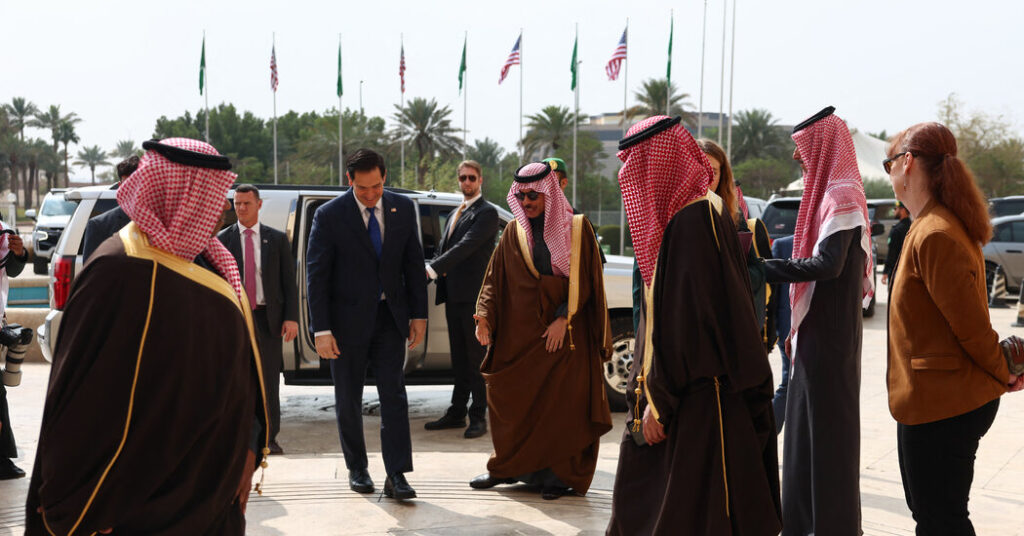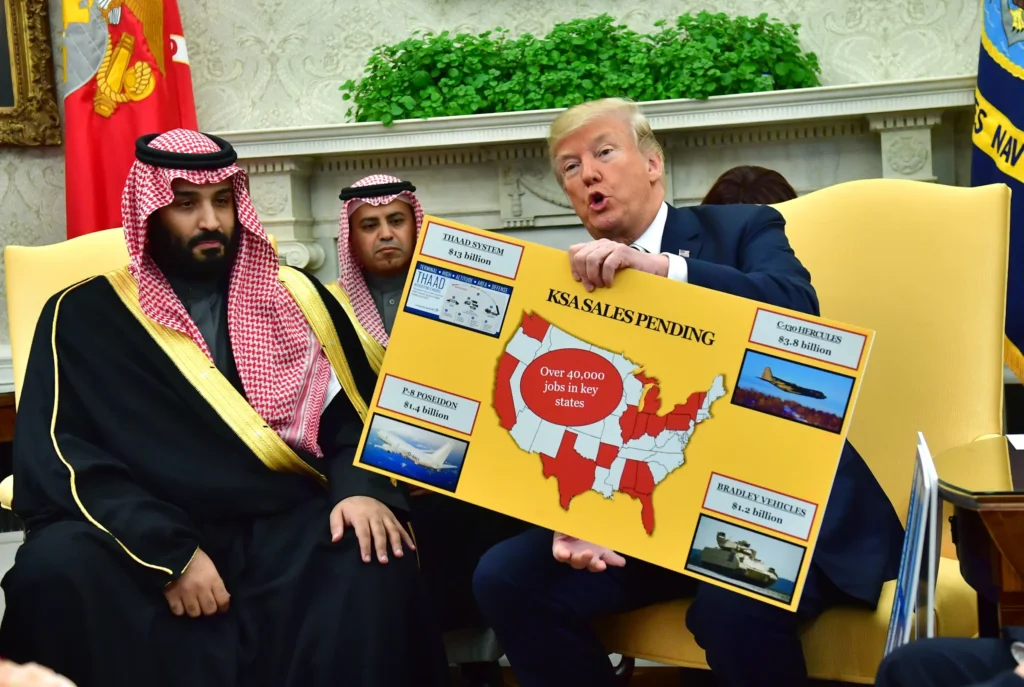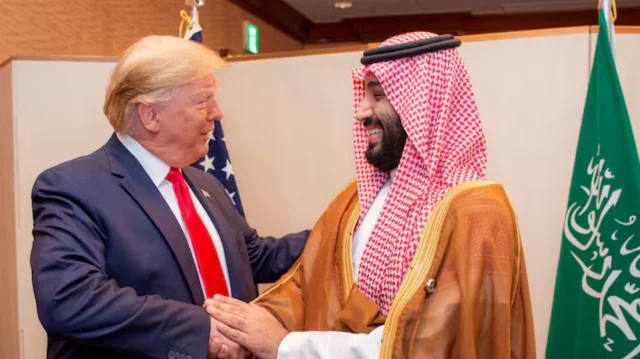In his second term, President Donald Trump is intensifying efforts to strengthen ties with Saudi Arabia, positioning the kingdom as a central player in achieving U.S. foreign policy and economic objectives. This renewed focus underscores Saudi Arabia’s growing influence in global diplomacy and economic affairs. The Middle Eastern powerhouse has long been a crucial partner to the United States, and under Trump’s leadership, the partnership is expected to expand significantly in areas of trade, energy, security, and diplomatic influence.
Saudi Arabia’s Role in Global Mediation
Saudi Arabia has emerged as a pivotal mediator in international conflicts, hosting high-level discussions on critical geopolitical matters. The kingdom played a key role in facilitating negotiations between the U.S. and Russia while also hosting talks on the future of Ukraine. These efforts highlight Saudi Arabia’s strategic importance in global diplomacy.

Crown Prince Mohammed bin Salman (MBS) has been instrumental in these mediation efforts, reflecting the deepening collaboration between Washington and Riyadh. As a close ally of Trump, MBS has taken proactive steps to position Saudi Arabia as a neutral broker in international conflicts, strengthening its global standing. This shift aligns with Trump’s foreign policy vision, which prioritizes leveraging strong alliances to resolve disputes and promote stability without direct U.S. military intervention.
Beyond conflict mediation, Saudi Arabia has also played a crucial role in brokering agreements on energy, arms deals, and economic investments. The nation’s ability to navigate complex diplomatic landscapes has made it an indispensable partner for the Trump administration, particularly as the U.S. seeks to counter growing influences from China and Russia.
Economic Partnerships and Investments
The economic relationship between the U.S. and Saudi Arabia has seen significant developments over the past decade. During Trump’s first presidency, agreements worth approximately $350 billion were signed between the two nations, benefiting American defense, energy, and technology companies. These agreements not only strengthened Saudi Arabia’s military capabilities but also provided a boost to the U.S. economy, reinforcing the interdependence between both countries.
In a recent discussion between President Trump and Crown Prince Mohammed bin Salman, the Saudi leader expressed his country’s intention to invest $600 billion in the United States over the next four years. This substantial commitment is expected to target key sectors such as technology, real estate, infrastructure, and renewable energy, further solidifying economic cooperation between the two allies.
Furthermore, Saudi Arabia’s investments in American startups and tech companies have increased significantly, reflecting a broader shift toward economic diversification under the kingdom’s Vision 2030 initiative. The initiative, spearheaded by MBS, aims to reduce Saudi Arabia’s dependence on oil revenues by expanding its investments in industries such as artificial intelligence, entertainment, and tourism. These economic ventures align well with Trump’s America First policy, which prioritizes job creation and economic growth through foreign investments.
Trump’s Upcoming Diplomatic Engagements in the Middle East
As part of his strategic outreach, President Trump is reportedly planning a visit to Saudi Arabia, Qatar, and potentially the United Arab Emirates. The details of this trip are still being finalized, but sources indicate that the visit will focus on securing a landmark economic agreement. One of the key proposals under discussion involves Saudi Arabia potentially investing up to $1 trillion in the U.S. economy, including significant purchases of American military equipment and technology.
This visit would mark Trump’s first foreign trip of his second term, emphasizing the significance of Middle Eastern alliances in his broader foreign policy strategy. By prioritizing economic diplomacy and strategic partnerships, Trump aims to solidify U.S. influence in the region while countering China’s expanding economic footprint.

Another key agenda item during the visit will be discussions on energy cooperation. Saudi Arabia, as the world’s leading oil exporter, plays a crucial role in stabilizing global energy markets. Trump’s administration is expected to push for increased oil production to help stabilize prices and ensure energy security. This move aligns with the administration’s focus on achieving energy independence and mitigating the impact of global economic fluctuations.
Strategic Implications for U.S.-Saudi Relations
The deepening partnership between the U.S. and Saudi Arabia carries significant strategic implications. First, Saudi Arabia’s evolving role as a mediator in conflicts like the Ukraine-Russia war and broader Middle East disputes demonstrates its growing influence on the global stage. By aligning with Saudi Arabia, the Trump administration gains a powerful ally that can help navigate complex geopolitical issues without direct U.S. military involvement.
Second, economic collaborations between the two nations present significant benefits for both parties. Saudi investments in the U.S. promise to generate jobs and boost industries ranging from technology to defense. In return, Saudi Arabia secures access to cutting-edge American innovations and military technology, further strengthening its regional dominance.
Finally, energy cooperation remains a central pillar of the U.S.-Saudi alliance. The Trump administration’s push for increased oil production from Saudi Arabia is a strategic move to counteract global energy instability. With concerns about fluctuating oil prices and the potential economic impact of conflicts in the Middle East, maintaining a steady energy supply is crucial for both nations.
Potential Challenges and Criticism
Despite the apparent benefits of a strengthened U.S.-Saudi relationship, the alliance is not without its challenges. Critics argue that Trump’s close ties with Saudi Arabia may lead to concerns about human rights issues, particularly in light of past controversies such as the killing of journalist Jamal Khashoggi. Human rights organizations have called for increased scrutiny of Saudi Arabia’s domestic policies, urging the U.S. to leverage its influence to promote democratic reforms in the kingdom.
Additionally, Saudi Arabia’s involvement in regional conflicts, including its role in Yemen, has sparked international criticism. Some policymakers in Washington worry that deeper economic and military ties could indirectly support Saudi-led military operations that have faced accusations of human rights violations.
However, Trump’s administration has largely prioritized strategic and economic interests over human rights concerns, arguing that a strong alliance with Saudi Arabia serves broader U.S. national security objectives. Trump has consistently defended Saudi Arabia as a key partner in countering terrorism, stabilizing oil markets, and promoting economic growth.
Conclusion
President Trump’s engagement with Saudi Arabia reflects a strategic approach to leveraging key international partnerships to achieve U.S. foreign policy and economic goals. As the Middle East’s geopolitical landscape evolves, the U.S.-Saudi alliance remains a cornerstone of the administration’s strategy, with significant implications for regional and global stability.
With upcoming diplomatic visits, major economic deals, and continued collaboration in energy and security, the U.S.-Saudi relationship is poised to enter a new era of strategic cooperation. While challenges remain, the benefits of this alliance for both nations are clear: economic growth, geopolitical stability, and strengthened diplomatic ties. As Trump navigates his second term, Saudi Arabia will likely continue to play a crucial role in shaping U.S. foreign policy in the Middle East and beyond.
Crypto Meets Forex: Bahrain’s SGB Pioneers Financial Innovation



